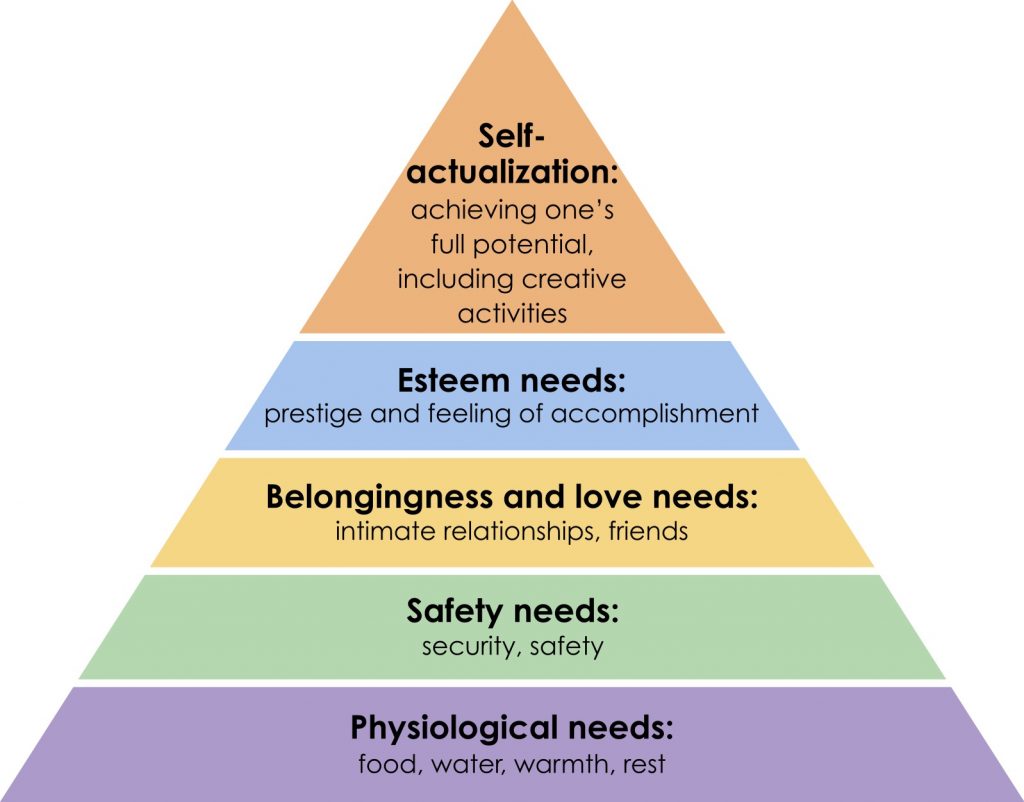Understanding human motivation
Whether it’s talking to an employee or trying to sell to a potential client, understanding human motivation is vital to success. Human behavior isn’t arbitrary; the more we can understand what drives human decision making, the easier it is to navigate employee management and sales success. Understanding people helps you place employees in the right place, helps you understand how best to communicate with them, and is useful when promoting the best people for the job. Understanding people is also useful for increasing sales and capitalizing on every call.
Maslow’s Hierarchy of Needs
One of the most widely recognized charts depicting the root of human motivation is Maslow’s Hierarchy of Needs. It was originally proposed in 1943 by Abraham Maslow as part of his paper called A Theory of Human Motivation. While scholars have revised the theory to a degree over time, it is largely intact and used to this day.
Maslow’s theory basically states that human needs, which drive motivation, are broken up into tiers of importance, not unlike a pyramid. The greater and more pressing needs are on the bottom, indicated by the wider portion of the chart, while subsequent needs are incrementally smaller and rest on the needs below.

Basic Needs
Maslow theorized that when it comes to motivation, humans prioritize basic needs first. This includes food, water, shelter, safety and security. Without these basic needs attended, it’s difficult to focus on other things that don’t satisfy those needs.
Employees
It’s not uncommon for most employees to fall under this category – a job is just meant to fulfill basic needs. A paycheck helps provide food, shelter, warmth, and safety. You will have employees who only come to work for this reason. These could be temporary employees, or technicians who are using your business as a stepping stone. Realistically, many of your employees will be solely motivated by basic needs.
Customers
The same can be said for customers. I recall seeing a discussion about lower income prospects, and how income relates to sales. Many potential customers who are lower on the income scale will have less motivation to invest in services that aren’t fulfilling basic needs. This is why pressure washing is harder to sell than plumbing, hvac, and electric services. Most people associate these other services with shelter, warmth, and basic needs. This doesn’t mean it’s impossible to sell to lower income, it just means you need to understand their motives to best sell to them.
Esteem Needs
The next tier of needs addresses the human desire for love, camaraderie, inclusiveness, friendship, and accomplishment. This is where your company leaders start to develop, and could include roles like route manager, general manager, shop manager, etc. The best way to develop employees who want to stick around (and who you want to stick around) is through work culture.
Work Culture
Great work culture provides employees with a road map to success, and offers to fulfill their need for accomplishment, camaraderie, and friendship. Here are a few ways to introduce more work culture into your business model.
1. Weekly employee meetings
While meetings may seem tedious, it’s a great way to gather your guys together briefly during a work week. You can provide donuts and coffee, offer a reward program for great work, and do toolbox safety. Meetings don’t have to be long to help with work culture, a 30 minute meeting on Monday morning or doing an after work meeting on Fridays are good ways to start.
2. Career advancement
Surprisingly a number of businesses don’t have a system in place for career advancement. Accounting for growth is important in any business, and your systems should be tailored toward scalability. It’s important for promotions to not be entirely arbitrary, as this leads to unhappy employees. Advancement should be fair, earned, and make sense for the business, yourself, and your employee. Quality of work, consistency, and customer service should play a part in deciding what your advancement strategy is.
3. Procedures
You might not think of procedures as being work culture, but having a set of procedures and policies that everyone is expected to follow helps develop trust between yourself and your employees. The less defined behavior boundaries, the faster tensions can develop as to why things are the way they are. A classic example is if a manager is being hard on an employee, the employee might chalk it up to a personal grudge. But if documentation is kept, and clear policies or procedures can be shown, it’s just a matter of good business and following company policy as opposed to a “me vs him” battle.
Customer Esteem
Esteem needs also translate to how to interact with customers. It also helps explain why the middle class and above tend to be more willing to invest in curb appeal. With basic needs attended to, consumers look to satisfy their other needs. This motivation leads to a desire for nicer cars, good landscaping, and yes, cleaner homes and concrete.
For many people, their home is their biggest investment. They want to appreciate it and have other people appreciate it. An easy way to identify with them is to compliment their house, their garden, or some aspect of their home or property. Not only does this play towards fulfilling their esteem needs, it also breaks down some of the social identity barriers that we naturally have up when we meet new people. The more you can identify with a potential customer, the more likely they are to trust you.
Great business relies on many factors, and often requires many things to go right to succeed at all. Understanding human behavior and what motivates decisions can go a long way to making business run smoother. Maslow’s Hierarchy of Needs is an excellent visual guide to understanding human motivation and can be applied to both employees and customers alike.
By Nathan Redelfs – Business Manager, Agent Clean Solutions


Great, useful, practical article !!
As a Ph.D. Business Psychologist, I can attest that article author Nathan Redelfs did a wonderful job giving readers good insights + advice.